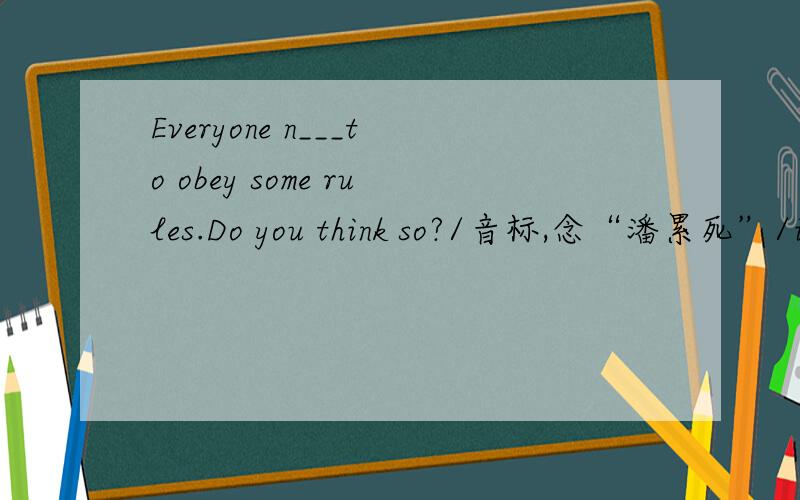Everyone n___to obey some rules.Do you think so?/音标,念“潘累死”/is a building in some place
来源:学生作业帮助网 编辑:作业帮 时间:2024/05/03 03:48:32

Everyone n___to obey some rules.Do you think so?/音标,念“潘累死”/is a building in some place
Everyone n___to obey some rules.Do you think so?/音标,念“潘累死”/is a building in some place
Everyone n___to obey some rules.Do you think so?/音标,念“潘累死”/is a building in some place
need palace
Everyone n___to obey some rules.Do you think so?/音标,念“潘累死”/is a building in some place
Everyone in school should obey the rules._____ _____ us should obey the rules.
Everyone in school should obey the rules(同义句)( )( )us should obey the rules.
Everyone should obey the rules(同义句)____ ____ us should obey the rules.
Everyone in school should obey the rules的同义句
everyone should obey the rule 变为一般疑问句
He knows everyone in school should obey the
Everyone ____ ______ _____(应该) obey the law
Everyone in school should obey the rules.同义句 ----- ----- us in school should obey the rules.填空
we must obey the traffic rules to make everyone s----- on the road
I n___to see each other.
Everyone in school should obey the rlue的同义句是什么题目是这样的— — us should obey the rlue
Do we need( )on the sidewalk?Yes Everyone should( )the traffic rules.A.to walk; B.to walk;to obey D.walk;obey
Do we need( )on the sidewalk?Yes Everyone should( )the traffic rules.A.to walk; B.to walk;to oDo we need( )on the sidewalk?Yes Everyone should( )the traffic rules.A.to walk; B.to walk;to obey Cwalk;to obey D.walk;obey
新概念2 16课的摘要写作问Can anyone fail to obey a request like this or not?答案为Everyone cannot fail to obey a request like this.为什么提问中的anyone要改成everyone呢 不是anyone常用于否定句而everyone常用于肯定句
If everyone b_______ the traffic rules,the road will not be safe.求吧,为什么我感觉是obey 但是却是b开头的呢?
Everyone
选择填空 ()1. If everyone ( ) the traffic rules , the roads will be safer. to obey B. obeying选择填空()1. If everyone ( ) the traffic rules , the roads will be safer.A.to obey B. obeying C. Obeys()2. I warned her ( ) near the